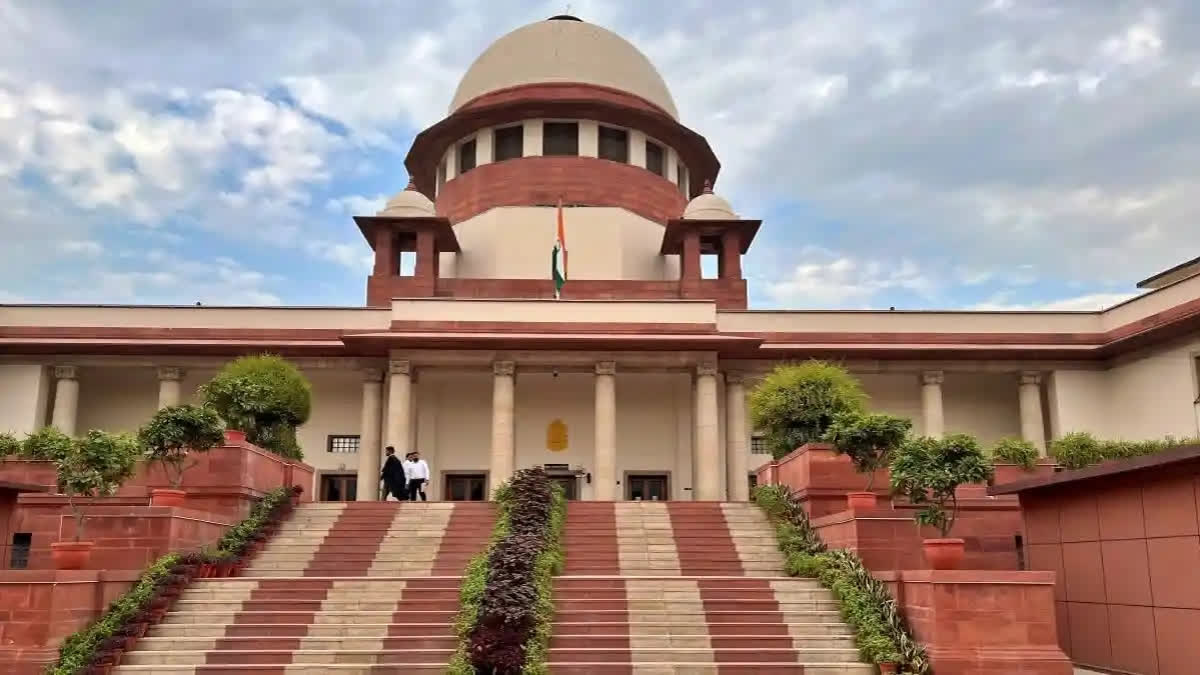New Delhi: The Supreme Court on Thursday said if bits of copper slag are still lying somewhere, isn’t the Tamil Nadu government precipitating the alleged issue of pollution, associated with Vedanta’s copper smelting plant in Thoothukudi, and since the unit has been shut since 2018, why wasn't it removed?
A three-judge bench led by Chief Justice of India and comprising Justices J B Pardiwala and Manoj Misra shot a volley of questions at senior advocate C S Vaidyanathan, representing the Tamil Nadu government. Justice Pardiwala asked Vaidyanathan if there are bits of copper slag still standing today? Vaidyanathan said, "Surprisingly! yes even today". Justice Pardiwala said, “Surprisingly! What are you doing? Their unit has been closed for the past 5 years, do not expect them to dispose…”
Vaidyanathan said the company took permission to enter the unit and to take away everything and dispose of it. “What are all you doing? Aren’t you precipitating the whole issue?”, said Justice Pardiwala. The state’s counsel said they will give the company "one last chance". "That means, the unit is closed since 2018, now we are pointing the finger at you people, forget about them. They have always been like this....," said Justice Pardiwala. Vaidyanathan said the state reminded the company about this in 2022.
“These heaps (copper slags) at 11 different sites...been there for 5 years...what have you done for the past 5 years, from 2018-2024? You will again draw a sample from that and you will show us, look at the level of arsenic, level of mercury...." said Justice Pardiwala. Vaidyanathan said: "We take the hint that we should do it and then take costs from them".
During the hearing, the bench said an industry has to comply with the law and it cannot say that it will only comply with those provisions which authorities point out. “But when it is the closure of an industry, on the ground of violation then you have to point out what the violation is. Because you cannot close down the industry for undefined violation, as an investment has been made in the industry…violation has to be stated if you are closing an industry down”, the bench told the Tamil Nadu government counsel.
The state government stressed that the company sought renewal but the government declined. “This is renewal and when an industry has been established then they expect a renewal subject being compliant to the law. If you are denying renewal, then you must specify the grounds on which renewal was denied”, said the CJI. The bench said it is keen to know, after the court's 2013 decision, what is the position of the industry and what are the steps which were to be carried out by the industry.
The bench said the experts can look into this: post 2013, “can the operation of the industry be compliant with environmental standards by adopting remedial steps or is closure the only option? The approach of our court was closure only if remedial steps cannot be taken, if remedial steps can be taken don’t close ... .that was the view of this court”.
The bench asked the Tamil Nadu government counsel post 2013 what are the violations, are these violations such they “had an irreparable impact on the environment…..which means the industry has to be closed down, or are these capable of remediation, if so, what are the steps for remediation”. “Based on their track record and violation pointed out by the state, what steps court can take in terms of monetary imposition to ensure they make a good faith….”, said the bench.
The bench stressed, “We have seen the background also; it can’t be they have a free-run and go on polluting the environment. We have to look at what happened post 2013….a team will include you (state government) but we will also include domain experts, if they tell us sorry! This industry cannot run. We will go by what they”.
“If they say xyz can be done by them (industry)….Now if you say the state does not trust the industry, we can impose terms on them of deposit in escrow account…..is it not necessary for us now that some dispassionate expert go into?”, added the bench.
The state government pressed that the high court had gone into it and rendered findings, and the expert body cannot sit in judgment on the high court’s findings. “That would be virtually outsourcing adjudicatory function…”, said Vaidyanathan, adding that the institutional credibility is at stake.
CJI said: “we are not outsourcing ... .has the high court relied upon any expert report post 2013”. Vaidyanathan replied in affirmative and added, it was found they polluted and “29 out of 30 conditions were fulfilled ( by the company), two of the conditions which said you will dispose of copper slag and gypsum 1:1.5. They said we have started doing it from 2012 and therefore, we have fulfilled it”. “This is a process which should have continued and no quantity should have remained. They breached the condition. Therefore, where is the compliance….”, he added.
The arguments in the matter remained inconclusive and will continue on February 29.
In 2018, the Tamil Nadu Pollution Control Board (TNPCB) ordered the closure of the controversial Sterlite Plant after massive protests by locals, social and environmental activists who alleged that the facility was causing widespread and severe pollution, leading to the spread of serious diseases among locals. The decision of the Tamil Nadu Pollution Control Board was later upheld by the Madras High Court in August 2020.
Read More



